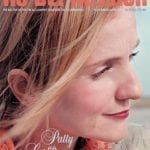Riley Baugus – Down from Cold Mountain
“As an old-time musician, I hope to take old-time music to a much broader audience,” Riley Baugus says. “If you notice, everyone who ever hears a banjo or fiddle stops and listens, usually tapping their foot and smiling. Most people like it I think, but it just doesn’t seem very cool to like it. That is what I’m hoping to do, is to help raise the cool factor so that people feel more comfortable publicly liking the music.”
Riley Baugus has had plenty of opportunities to fulfill his quest as of late. Playing fiddle, clawhammer banjo and guitar, Baugus has contributed to the Cold Mountain soundtrack, taught workshops with Norman Blake and others, toured Europe with traditional dancer/fiddler Ira Bernstein, toured the United States as part of the Dirk Powell String Band or with Tim O’Brien, played with his local band Polecat Creek, produced records, and played local square dances.
Emulating his father and grandfather, who were also musicians, Baugus began playing the fiddle at age 10. He switched to guitar shortly thereafter and quickly attracted attention with his powerful, driving style.
At 13, he built a banjo from scrap wood with help from his father. “We laid the neck board up next to a guitar and marked where the frets were supposed to go and used a hacksaw to cut the slots,” he explains. “The head and back of the banjo were circles cut from plywood. The rim was made from a piece of scrap molding. It was all nailed and screwed and glued together, but it worked. I played on it until I could afford an $80 Kay banjo from the local pawnshop.”
That initial childhood experiment helped lead to Baugus’ side-career as an instrument maker. “One day, a guy gave me a walnut 4×4 that looked like it should be a banjo neck,” he remembers. “So with some spare parts I had laying around, and some advice from friends, I started building banjos. It took a lot of trial and error, but eventually, I got pretty good at it.”
As a musician, Baugus took his cues on banjo from legendary old-time musician Tommy Jarrell, whose playing “was melodic, yet rhythmic. It wasn’t like Grandpa Jones’ thrashing style; that never fascinated me too much. But when I heard a style of clawhammer that was melodic and rhythmic, I said ‘Man, that’s just cool as can be.’ That’s why I went to it.”
Baugus began soaking up all he could from older musicians in the area, and became a regular fixture at all the local festivals. “Dirk Powell and I met each other at Galax [Virginia], at the National Fiddlers Convention,” he recalls. “He was about 14 and I was about 17, and we immediately hit it off. We both loved hard-driving music….We were learning together, and growing up together. Dirk went on to play in Tim O’Brien’s band, the Cajun band Balfa Toujours, and scoring films. We’ve been close friends for more than 20 years now.”
It was his friendship with Powell that led to Baugus’ big movie break. Baugus was working as a welder and blacksmith, installing ornamental handrails in Elizabeth City, North Carolina, when Powell called one day. “He said, ‘Hey man, I’m out here in L.A. working with Anthony Minghella and T Bone Burnett and they’re gonna do the film adaptation of Cold Mountain. I told them that you were a great banjo player and singer and that you made banjos. We thought it would be cool to have a banjo from North Carolina; send us one.’
“I shipped them one, they loved it, and they placed an order for three of them. While I was building them, they called me up and said, ‘There’s this part we haven’t cast yet. It’s the singing voice of Pangle, the banjo player in the film.’ A fat retarded banjo player that lives in the mountains of North Carolina. I was born to play that part,” Baugus laughs.
His contribution to Cold Mountain wasn’t the factor that led Baugus to quit working as a welder and blacksmith, however. “I wish I could say that the movies let me quit my day job, but the truth is, my day job quit me, due to the economy,” he explains. “I had been looking for a way out because I was getting more and more successful at playing music, and I thought, if I can work for myself and I can build banjos and I can do some gigs, I can make a living.
“I won’t get rich, but I don’t need to be rich. I live pretty simply in a trailer out in the country.”




